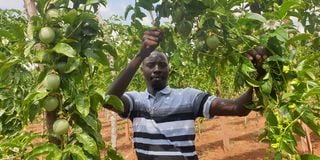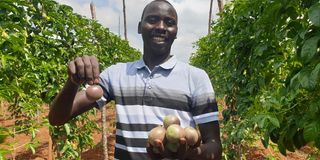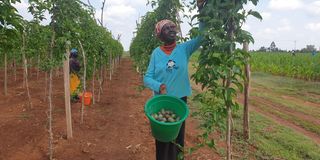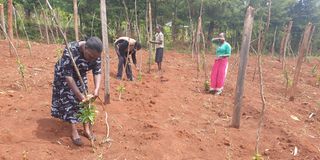Premium
Passion for agribusiness pushes youth into passion fruit farming

Edwin Rono, 32, at his passion fruit farm in Uasin Gishu County. He says his successful venture into agribusiness is proof that self-employment and creating jobs for others is possible among the youth.
A drive along the Eldoret-Moiben road is breath-taking.
You will see many farms with a healthy maize crop, with mushrooming estates being evidence of a developing area.
On the left though, is a different farm altogether. A thriving passion fruits leaves one yearning for the citrus fruit in fresh form, or maybe, a glass of juice would do.
But there is more to this passion fruits’ farm which is yet to be given a business name.
We meet Edwin Rono, 32, the owner, who grows passion fruits on 14 acres spread around three locations in this area. He is a Class Four dropout but he has beaten all odds to venture into agribusiness, proving that self-employment and creating jobs for others is possible among the youth.
On this Wednesday morning, he accompanies his workers, most of whom are youthful, in attending to the orchard.
Some of them, mostly women, are picking fruits and pruning the plants while others, mostly men, are applying top dressing fertiliser. In total, Rono has 26 employees.

Workers punning passion fruit plants at Edwin Rono's farm in Uasing Gishu County. The 32-year-old farmer says he does not regret abandoning maize farming for passion fruits.
Neat orchard
The lack of weeds in this farm gives an impression of a well-taken-care-of orchard, one would be forgiven for thinking it is run by a highly professional person of firm.
Rono’s passion fruits’ farming journey dates back to 2018, after what he says was a nasty experience in maize farming.
“I had just sold maize when there emerged a scam countrywide, which exposed massive corruption at the National Cereals and Produce Board (NCPB),” recalls Rono.
He recalls that he had then delivered 10,000 90kg bags of maize, but through a proxy.
Having witnessed the challenges and irregularities, especially in payments to maize farmers, Rono decided to venture into passion fruit farming.

Edwin Rono displays ripe passion fruits harvested at his farm
Zero political interference
“I wanted a sector that has zero political interference and after consulting with several people, I was advised to start passion fruit farming,” says Rono
His initial capital was Sh400,000, which he got from maize farming. He started with three acres of passion fruits in 2018, which he has gradually increased.
From one farm, he harvests about 1,200 kilogrammes of fruits weekly and sells them at between Sh60 to Sh120 per kilo, depending on demand and supply.
His main market is Uganda, he says. But he is quick to add that prices dropped during the recent elections in Uganda which were marred by a lot of chaos. During the period, prices dropped to between Sh10 and Sh20 per kilogramme.
As the World Youth Skills Day is marked globally today (July 15), Rono calls on young people to embrace agribusiness as a way of enhancing their talents, earning a living and empowering communities.
“Young people are innovative and dynamic, and should therefore use these attributes to enhance skills even in sectors that are considered informal,” says Rono
Rono hopes to benefit from the European Union (EU)-supported Market Access Upgrade Programme (Markup) Kenya, which aims to promote competitiveness and market access for produce along selected value chains, with special focus on youth and women.

A worker harvesting fruits at Rono's farm. Rono grows passion fruits on 14 acres spread around three locations.
Remove middlemen
“I currently rely on middlemen from Uganda, but would be interested to know how I can sell directly access the international market,” says Rono
If he gets market linkage, Rono says he will increase his passion fruit acreage to 40 acres, employ more youths and women, and mentor others to venture into passion fruit production.
Markup Kenya is implemented across 12 counties by the United Nations Industrial Development Organisation (Unido) in partnership with the government and the private sector.
Unido Kenya Deputy Representative Linet Luvai notes that the high rate of unemployment among the youth is likely to affect the targeted achievement of Sustainable Development Goals (SDGs).
Stability among the youth, she adds, comes in handy in curbing criminal activities such as terrorism.
Noting that about 75 per cent of the youth are unemployed, Ms Luvai says Markup Kenya will attract them to agriculture sector as a viable and interesting way of creating self-employment as well as opportunities to employ other young people.
Influencer programmes
To specifically reach out to the youth, Markup Kenya will run several podcasts and influencer programmes which will be informative and educative in order to promote agriculture.
In support of young people in passion fruits farming, Uasin Gishu county government has been assisting youth groups with seedlings and farm inputs in a bid to empower and encourage them to embrace agribusiness.
Mr Ismael Asowa, the county Agriculture Deputy Director, who is also the Agribusiness Officer, notes that the passion fruit have been identified as a high value crop.
“In the financial year 2019-2020, the county government recruited 120 groups, each of which received 700 seedlings to plant in one acre,” says Mr Asowa.
The groups further received fertiliser, agrochemicals and water tanks among other items.
Among the groups which received support from the county government is Kulongei in Kapsabet, which comprises of 15 members.

Members of Kulongei group in Kapsabet tend to their crop. The group, with 15 members, hopes to get market linkage through the Markup Kenya programme.
Expecting harvest
This group planted seedlings in May and it expects to harvest fruits in the next 16 months. Like Rono, the group chairman Richard Kiprop says he hopes to get market linkage through the Markup Kenya programme.
Both Rono and this group say they would also like to get access to water, as passion fruits need irrigation, yet climate change often causes unpredictable rainfall patterns and prolonged dry periods.
“We welcome Markup Kenya to identify the shinning groups and support them in their quest to thrive in the passion fruits agribusiness,” says Mr Asowa.
He urges young people to take up agribusiness as a full-time or part-time career, noting that it does not necessarily need specialised skills or education, and, therefore, fits youths across all demographics.
Mr Asowa advises youth people to take advantage of available funding opportunities, including the government’s Youth Enterprise Development Fund, which has an attractive interest rate of just five per cent.





